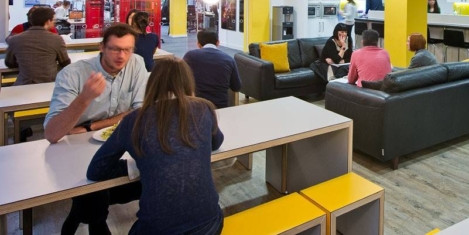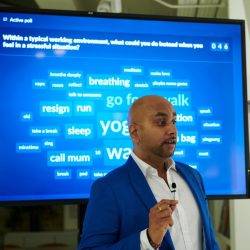November 16, 2018
Biophilic design the key to improving mental health, productivity and stress levels
 An expert panel at this week’s Welcome to the Biophilic Concrete Jungle event in London made the case for incorporating the principles of biophilic design into the workplace, including for health and wellbeing considerations, the promotion of productivity and to address workplace stress and urban disconnection from nature. HOK organised the event. Panellists included Joyce Chan, Head of Sustainability and Trina Marshall, Regional Leader of Consulting from HOK, Professor Derek Clements-Croome from Reading University, Alexander Bond from Biophilic Design and Dr Ed Suttie from BRE.
An expert panel at this week’s Welcome to the Biophilic Concrete Jungle event in London made the case for incorporating the principles of biophilic design into the workplace, including for health and wellbeing considerations, the promotion of productivity and to address workplace stress and urban disconnection from nature. HOK organised the event. Panellists included Joyce Chan, Head of Sustainability and Trina Marshall, Regional Leader of Consulting from HOK, Professor Derek Clements-Croome from Reading University, Alexander Bond from Biophilic Design and Dr Ed Suttie from BRE.
















 Over a quarter of businesses plan to hire temporary or contract staff in the next 12 months to help plug skills shortages created by digitalisation as more than half of CEOs are concerned about a lack of digital skills within their organisation. This is according to the Robert Half 2019 Salary Guide which argues that technology is reshaping businesses; with two in five UK organisations (38 percent) considering digitalisation as the main evolving force in the workplace today. This shift has created demand for a new set of skills, such as DevOps, data visualisation, data management and analytics. While softer skills such as resilience, adaptability and critical thinking remain key characteristics in potential employees, a third (31 percent) of employers state that a candidate’s technical skillset is their most important consideration when making a new hire. Around 1.6 million1 (28 percent) UK businesses plan to hire temporary or contract staff in the next twelve months, to combat the lack available talent required, which is creating a critical skills gaps in the workplace.
Over a quarter of businesses plan to hire temporary or contract staff in the next 12 months to help plug skills shortages created by digitalisation as more than half of CEOs are concerned about a lack of digital skills within their organisation. This is according to the Robert Half 2019 Salary Guide which argues that technology is reshaping businesses; with two in five UK organisations (38 percent) considering digitalisation as the main evolving force in the workplace today. This shift has created demand for a new set of skills, such as DevOps, data visualisation, data management and analytics. While softer skills such as resilience, adaptability and critical thinking remain key characteristics in potential employees, a third (31 percent) of employers state that a candidate’s technical skillset is their most important consideration when making a new hire. Around 1.6 million1 (28 percent) UK businesses plan to hire temporary or contract staff in the next twelve months, to combat the lack available talent required, which is creating a critical skills gaps in the workplace.

















November 18, 2018
What The Midwich Cuckoos can teach us about Millennials
by Mark Eltringham • Comment, Workplace
John Wyndham’s 1957 novel The Midwich Cuckoos is the story of a fictional English village in which, following an unexplained event that causes everybody within Midwich to fall unconscious, all of the women in the village fall pregnant and 61 children are subsequently born all at the same time. The children bear absolutely no physical resemblance to their parents, with pale skin, blond hair and piercing eyes. As they grow older it also becomes apparent that they are strange, emotionless and have a telepathic bond with each other. It’s not much of a spoiler to tell you that things don’t go well. The only rationale for what had happened to create the children in the first place is an unexplained incident of xenogenesis – the birth of offspring unlike their parents. Something similar must have happened on a global scale from the beginning of the 1980s onwards, at least based on what we are told about Millennials.
More →